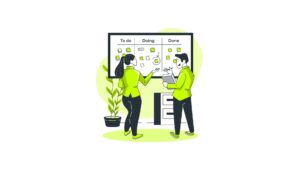Accept Cookies & Privacy Policy?
We use cookies to ensure that we give you the best experience on our website. If you continue to use this site we will assume that you accept and understand our Privacy Policy, and our Terms of Service.
The following profiles are a typical representation of the naturalized job hierarchy in the QA career ladder one step at a time
Starting with
A Junior Test Engineer or Entry-Level QA Analyst is an early-career professional responsible for assisting in the testing of software applications. They work under the guidance of senior QA professionals to execute test cases, report defects, and ensure the quality and functionality of software products. They are equipped with foundational knowledge in testing practices and play a vital role in ensuring the reliability of software systems.
Average Salary
(INR): ₹2,50,000 to ₹5,00,000 per annum
(USD): $3,400 to $6,800 per annum
Education Qualification: Bachelor’s degree in Computer Science, Information Technology, or a related field. Additional certifications in Software Testing or Quality Assurance are a plus.
Skills Sets: Basic understanding of software testing principles, familiarity with testing tools and methodologies, attention to detail, strong analytical and problem-solving skills, good communication skills.
While automation is gaining prominence, manual testing remains an essential part of the software testing landscape. Manual testers meticulously execute test cases, identify defects, and provide valuable insights into the user experience. This role surely demands strong analytical skills and attention to detail.
Skill Sets: Attention to detail, analytical thinking, communication skills, understanding of testing techniques and methodologies.
Education Qualification: A bachelor’s degree in Computer Science, Information Technology, or a related field is often preferred.
Average Salary
INR: ₹300,000 to ₹700,000 per year
USD: $40,000 to $90,000 per year
If honed those automation skills as a software tester, stepping into the role of a Test Automation Architect could be a natural progression. In this capacity, one designs automation frameworks, sets best practices, and guides the team to create robust automated test suites. It’s a strategic role that requires a deep understanding of testing tools and coding expertise.
Skill Sets: Proficiency in automation testing tools and frameworks, programming skills (e.g., Java, Python), knowledge of testing best practices and methodologies.
Education Qualification: A bachelor’s degree in Computer Science or related field. Some roles may require additional certifications in automation testing.
Average Salary
INR: ₹800,000 to ₹1,500,000 per year
USD: $60,000 to $120,000 per year
As experience grows, transitioning into a QA Manager role becomes a viable option. QA Managers oversee entire testing teams, manage resources, define testing strategies, and ensure the quality of all software products. Effective leadership and communication skills are vital in this role, as you’ll be coordinating efforts across multiple projects.
Skill Sets: Leadership and management skills, strong communication and interpersonal abilities, strategic thinking, experience in testing methodologies and tools.
Education Qualification: A bachelor’s degree in Computer Science or related field. Higher positions may require a master’s degree in Business Administration (MBA) or a similar field.
Average Salary
INR: ₹1,000,000 to ₹2,500,000 per year
USD: $70,000 to $150,000 per year
The DevOps field is all about continuous integration and continuous delivery (CI/CD). Software testers with a knack for automation and an understanding of development and operations processes can find a seamless transition into DevOps roles. One will be responsible for automating deployment pipelines, ensuring smooth software releases, and optimizing workflows.
Skill Sets: Knowledge of continuous integration and deployment (CI/CD) tools, proficiency in scripting and automation, understanding of development and operations processes.
Education Qualification: A bachelor’s degree in Computer Science, Information Technology, or related field. Certifications in DevOps tools can be beneficial.
Average Salary
INR: ₹800,000 to ₹1,800,000 per year
USD: $60,000 to $120,000 per year
Software testers are well-equipped to transition into Business Analyst roles due to their strong analytical and problem-solving abilities. In this position, it’s about working closely with stakeholders to gather and analyze business requirements, bridging the gap between business needs and software development.
Skill Sets: Analytical and problem-solving skills, business process understanding, communication skills, ability to gather and analyze requirements.
Education Qualification: A bachelor’s degree in Business Administration, Computer Science, or related field. Additional certifications in business analysis can be advantageous
Average Salary
INR: ₹600,000 to ₹1,200,000 per year
USD: $45,000 to $90,000 per year
For all those software testers with a passion for product development, becoming a Product Manager is an exciting path. One’ ll be responsible for defining the product vision, roadmap, and features, ensuring alignment with customer needs and market trends. This role demands a blend of technical knowledge, creativity, and customer-centric thinking.
Skill Sets: Strategic thinking, product development knowledge, market research, communication skills, customer-centric mindset.
Education Qualification: A bachelor’s degree in Business, Computer Science, or a related field. Some roles may require an MBA or equivalent
Average Salary
INR: ₹1,200,000 to ₹3,000,000 per year
USD: $80,000 to $180,000 per year
Scrum Masters facilitate agile development processes, ensuring teams are efficient and productive. Software testers often excel in this role due to their understanding of the software development lifecycle and their ability to collaborate with cross-functional teams.
Skill Sets: Knowledge of Agile methodologies, facilitation and leadership skills, understanding of the software development lifecycle.
Education Qualification: While a specific degree is not always required, certification in Agile/Scrum (e.g., Scrum Master, Certified ScrumMaster) is highly beneficial.
Average Salary
INR: ₹800,000 to ₹1,800,000 per year
USD: $60,000 to $120,000 per year
With the growing importance of cybersecurity, software testers can pivot into Security Analyst positions. One will focus on identifying vulnerabilities, conducting security assessments, and implementing measures to protect systems and data from threats.
Skill Sets: Knowledge of cybersecurity principles, proficiency in security testing tools, understanding of vulnerabilities and threats.
Education Qualification: A bachelor’s degree in Computer Science, Information Security, or related field. Certifications like Certified Ethical Hacker (CEH) are valuable.
Average Salary
INR: ₹800,000 to ₹1,800,000 per year
USD: $60,000 to $120,000 per year
Becoming a Test Consultant allows you to leverage your expertise to help organizations improve their testing processes. One will work as an independent expert, advising clients on best practices, test strategies, and quality assurance methodologies.
Skill Sets: Deep expertise in testing methodologies and best practices, strong communication and consulting skills, ability to analyze and advise on testing processes.
Education Qualification: A bachelor’s or master’s degree in Computer Science, Software Engineering, or related field. Additional certifications in testing or consulting are beneficial.
Average Salary
INR: ₹1,000,000 to ₹2,500,000 per year
USD: $70,000 to $150,000 per year
Quality Assurance Engineers, often referred to as QA Engineers, are the gatekeepers of software quality. They work closely with developers and product managers to create and execute test plans, identify bugs and issues, and ensure that the software meets the specified quality standards. This role offers a solid foundation for those starting their career in software testing.
Skill Sets: Knowledge of testing tools and methodologies, attention to detail, communication skills, ability to work closely with developers and product managers.
Education Qualification: A bachelor’s degree in Computer Science, Information Technology, or related field is typically preferred.
Average Salary
INR: ₹300,000 to ₹700,000 per year
USD: $40,000 to $90,000 per year
Automation Testers specialize in creating automated test scripts and frameworks to streamline and accelerate the testing process. They use various testing tools and programming languages to write scripts that can perform repetitive tests efficiently. Automation testing is in high demand due to its ability to increase testing coverage and save time.
Skill Sets: Proficiency in automation testing tools, programming languages (e.g., Java, Python), understanding of testing frameworks, knowledge of CI/CD pipelines.
Education Qualification: A bachelor’s degree in Computer Science, Information Technology, or a related field. Additional certifications in automation testing can be beneficial.
Average Salary
INR: ₹500,000 to ₹1,000,000 per year
USD: $45,000 to $80,000 per year
Performance Testers focus on evaluating how software performs under different conditions, including load, stress, and scalability testing. They ensure that applications can handle a large number of users or data without performance degradation. Performance testing is crucial for applications like e-commerce websites and online games.
Skill Sets: Expertise in performance testing tools, knowledge of load testing methodologies, understanding of system architecture and infrastructure.
Education Qualification: A bachelor’s degree in Computer Science, Information Technology, or related field. Certifications in performance testing are advantageous
Average Salary
INR: ₹600,000 to ₹1,200,000 per year
USD: $50,000 to $100,000 per year
Security Testers, often known as Ethical Hackers or Penetration Testers, are responsible for identifying vulnerabilities and weaknesses in software applications to protect against cyber threats. They conduct security assessments to safeguard sensitive data and user privacy, making this role quite paramount in today’s cybersecurity landscape.
Skill Sets: Proficiency in security testing tools, knowledge of cybersecurity principles, understanding of vulnerabilities and penetration testing.
Education Qualification: A bachelor’s degree in Computer Science, Information Security, or related field. Certifications like Certified Ethical Hacker (CEH) are highly valuable
Average Salary
INR: ₹700,000 to ₹1,500,000 per year
USD: $60,000 to $120,000 per year
As the mobile app ecosystem continues to expand, Mobile App Testers specialize in evaluating the functionality and performance of mobile applications on various devices and platforms. They ensure that apps work seamlessly across iOS, Android, and other mobile operating systems.
Skill Sets: Proficiency in mobile testing tools, understanding of mobile platforms (iOS, Android), knowledge of mobile app development lifecycle.
Education Qualification: A bachelor’s degree in Computer Science, Information Technology, or related field. Familiarity with mobile app development
Average Salary
INR: ₹400,000 to ₹900,000 per year
USD: $35,000 to $80,000 per year
Usability Testers assess the user-friendliness and overall user experience of software applications. They conduct user testing sessions, gather feedback, and provide insights to enhance the software’s usability and interface design. This role bridges the gap between technical aspects and user satisfaction.
Skill Sets: User-centered design knowledge, usability testing methodologies, strong observation and communication skills, ability to provide actionable feedback.
Education Qualification: A bachelor’s degree in Human-Computer Interaction, Design, Psychology, or a related field. Certification in usability testing can be beneficial
Average Salary
INR: ₹500,000 to ₹1,000,000 per year
USD: $45,000 to $80,000 per year
QA Heads and Test Managers play a pivotal role in leading testing teams, creating test strategies, and managing test projects. They collaborate with stakeholders, allocate resources, and ensure that testing aligns with the overall project goals. Test Managers need strong leadership and project management skills.
Skill Sets: Leadership and management skills, strategic planning, communication and negotiation abilities, proficiency in testing methodologies.
Education Qualification: A bachelor’s degree in Computer Science or related field. Higher positions may require an MBA or equivalent.
Average Salary
INR: ₹1,200,000 to ₹3,000,000 per year
USD: $80,000 to $180,000 per year
A QA Trainer is responsible for educating individuals or teams on quality assurance principles, testing methodologies, and the effective use of testing tools. They possess strong communication skills and in-depth knowledge of QA processes to train professionals in software testing.
Average Salary
(INR): ₹4,00,000 to ₹10,00,000 per annum
(USD): $5,400 to $13,600 per annum
Education Qualification: Bachelor’s or Master’s degree in Computer Science, Engineering, or a related field. Certifications in Quality Assurance (QA) or Training and Development can be a plus.
Skills Sets: Strong knowledge of software testing principles, excellent communication and teaching skills, expertise in various testing tools and methodologies.
A QA Tools Developer focuses on creating and maintaining software tools that facilitate the testing process. They are proficient in programming languages and have a deep understanding of testing methodologies. Their work ensures efficient and effective quality assurance practices within a development environment.
Average Salary
(INR): ₹8,00,000 to ₹20,00,000 per annum
(USD): $10,800 to $27,100 per annum
Education Qualification: Bachelor’s or Master’s degree in Computer Science, Software Engineering, or a related field. Additional certifications in software development and proficiency in relevant programming languages are beneficial.
Skills Sets: Proficiency in programming languages like Java, Python, or C#, experience in developing and maintaining testing tools, in-depth knowledge of QA processes and methodologies.
A QA Evangelist is a thought leader and advocate for quality assurance within an organization. They champion best practices in testing, lead initiatives to improve quality processes, and stay updated on emerging trends in software testing. Their role is to inspire and guide teams towards achieving higher levels of quality in their products.
Average Salary
(INR): ₹10,00,000 to ₹25,00,000 per annum
(USD): $13,600 to $34,000 per annum
Education Qualification: Bachelor’s or Master’s degree in Computer Science, Engineering, or a related field. Additional certifications in Quality Assurance and Software Testing are valuable.
Skills Sets: Extensive experience in QA, strong leadership and communication skills, ability to evangelize and promote QA best practices, in-depth knowledge of emerging trends and technologies in software testing.
While software testing offers a strong foundation for a fulfilling career, the journey doesn’t stop there. As a software tester possesses valuable skills in problem-solving, critical thinking, and quality assurance can surely open doors to diverse career opportunities. Whether choosing to specialize further in testing, transition into management, or explore adjacent fields, the enriching experience as a tester surely serves as a solid stepping stone towards the next big career stage.
As software testing remains an indispensable discipline. Whether inclined towards manual testing, automation, security, or usability, there’s a niche for everyone as each role requires a unique skill set and offers a rewarding career path with opportunities for growth and continuous learning for all irrespectively.

So picture this: You’re the air traffic controller of a chaotic airport where the planes (developers) don’t always listen, the passengers (stakeholders) want to change destinations mid-flight, and the weather (unforeseen blockers) is always unpredictable.

Imagine a world where testing is no longer a bottleneck. No more endless cycles of manual effort, no more missed defects due to human fatigue, and no more panic at the eleventh hour before a major ERP rollout.

Imagine a world where testing is no longer a bottleneck. No more endless cycles of manual effort, no more missed defects due to human fatigue, and no more panic at the eleventh hour before a major ERP rollout.

Let’s talk about GenAI and testing in 2025—the wild west of technology where machines are not just smart, but scary smart. GenAI (that’s Generative AI for the uninitiated) is running the show everywhere. It’s writing poetry, designing ads, debugging code, and probably plotting to take over my job as I write this blog.

Ah, 2024—you’ve been a year, haven’t you? For us at Thought Frameworks, this year wasn’t just about running the usual QA/QE playbook. Nope, we went full throttle into the future—tinkering, testing, and transforming everything from ERP systems to the ever-evolving world of SAP, GenAI, and security testing.

So, you’re deep in the ERP trenches and trying to figure out the best approach between NetSuite and Oracle EBS. You’re certainly not alone! We can help break down how these two ERP giants stack up when it comes to ensuring systems run like clockwork but without the overload.
Accept Cookies & Privacy Policy?
We use cookies to ensure that we give you the best experience on our website. If you continue to use this site we will assume that you accept and understand our Privacy Policy, and our Terms of Service.
| Cookie | Duration | Description |
|---|---|---|
| cookielawinfo-checkbox-analytics | 11 months | This cookie is set by GDPR Cookie Consent plugin. The cookie is used to store the user consent for the cookies in the category "Analytics". |
| cookielawinfo-checkbox-functional | 11 months | The cookie is set by GDPR cookie consent to record the user consent for the cookies in the category "Functional". |
| cookielawinfo-checkbox-necessary | 11 months | This cookie is set by GDPR Cookie Consent plugin. The cookies is used to store the user consent for the cookies in the category "Necessary". |
| cookielawinfo-checkbox-others | 11 months | This cookie is set by GDPR Cookie Consent plugin. The cookie is used to store the user consent for the cookies in the category "Other. |
| cookielawinfo-checkbox-performance | 11 months | This cookie is set by GDPR Cookie Consent plugin. The cookie is used to store the user consent for the cookies in the category "Performance". |
| viewed_cookie_policy | 11 months | The cookie is set by the GDPR Cookie Consent plugin and is used to store whether or not user has consented to the use of cookies. It does not store any personal data. |
Ready for a Quality Software?
Let’s Dig Deep Into Your Thought!